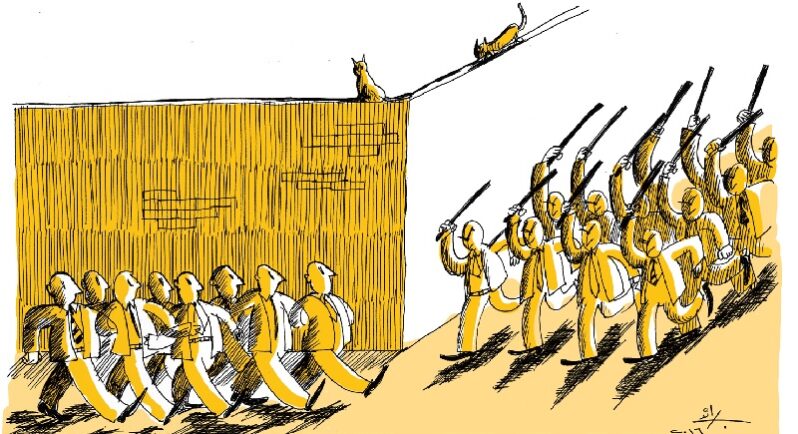Amending the Laws on Terrorism and Designating Terrorist Entities: Accessing Frozen Funds

On 3 March 2020, the Official Gazette published two laws – Law no. 14 of 2020 and Law no. 15 of 2020 – amending the counterterrorism law and the law on terrorist and terrorist entity lists. The amendments, which Parliament had passed less than two months earlier and were approved by the president,[1] focused primarily on broadening the definition of a “terrorist entity” and the crime of “financing terrorism” and expanding the consequences of being designated a terrorist entity or terrorist. These changes provoked a debate over the significance of these amendments and the purpose behind adopting them at the current time. According to the bill’s explanatory memorandum, which the government prepared and presented to Parliament while it debated the amendments, Egypt is undergoing a periodic review of its legal system for combatting money laundering and terrorism financing because of its membership in the Middle East and North Africa Financial Action Task Force (MENAFATF), the regional group specialized in combatting money laundering and terrorism financing. The government contends that because the evaluation will address Egypt’s uptake of the specific requirements included in the international standards issued by the Financial Action Task Force (FATF) – particularly the requirements to define the scope of the funds and assets and the meaning of financing terrorism, to criminalize travel to participate in terrorist activities, and to criminalize the activities of legal persons involved in a terrorist act on par with terrorist groups – there is now a pressing need to amend the counterterrorism legislative framework to meet international standards, in the interest of combatting terrorism and its financing.[2]
Yet the explanatory memorandum did not explain what exactly these international standards that must be met are. This arouses suspicion about the purpose of these latest amendments, especially as they unprecedentedly expand the definition of the funds liable to be frozen to include defendants’ private property. Such an expansion demands more explanation and reasoning because it affects an inherent constitutional right, namely the right to private property.[3] From another angle, some people argue that the amendments are merely another one of the legislative and executive measures that the current government is taking to end the issue of the funds frozen since 2013,[4] funds that the state seeks to add to its treasury as soon as possible.[5] Given these possibilities, this article presents a detailed analysis of the latest amendments to the counterterrorism law and the law on terrorist entity lists and their effects. It shall also attempt to understand the motivation behind them in light of the judgments the Court of Cassation made concerning terrorist designations.
Meeting International Standards or Another Attempt to End the Frozen Funds Issue?
The website of the MENAFATF, whose evaluation of Egypt the government cited as a justification for the latest amendments, states that
The MENAFATF is voluntary and co-operative in nature and independent from any other international body or organisation; it was established by agreement between the governments of its members and is not based on an international treaty [emphasis added]. It sets its own work, regulations, rules and procedures…[6]
Hence, the statement that the latest amendments resulted from an obligation upon Egypt to meet specific international standards is questionable practically and legally. At the same time, the last report evaluating Egypt in relation to money laundering and terrorism financing dates back to 19 November 2014.[7] This report did, in fact, contain several recommendations and observations about Egypt’s performance with regard to the lack of comprehensiveness of the Penal Code’s definition of terrorism financing[8] and the absence of a legal basis for freezing or seizing the assets of terrorist individuals or entities.[9] However, that report was clearly issued before the adoption of both the counterterrorism law and the law on terrorist entity lists in 2015. Hence, those recommendations were observed during the adoption of those laws, which included a comprehensive definition of funds that could be used for terrorist purposes[10] and established a legal basis for seizing and freezing such funds and assets.[11] Furthermore, MENAFATF’s publications never again mention in any way the need for Egypt to adopt any legislative measures or reforms related to those points.
Based on these facts and other available sources, it is likely that the government used the MENAFATF’s measures and recommendations as a pretext for introducing legislative amendments that allow it to more easily end the frozen funds issue. Since the issuance of a court judgment banning the Muslim Brotherhood’s activities and freezing its property in Egypt in 2013,[12] many measures that accelerate the incorporation of these frozen funds into the state treasury have been taken. These measures began with the formation of a committee to administer the Muslim Brotherhood’s funds,[13] whose decisions were mostly suspended by the administrative judiciary on the grounds that they were administrative, not judicial, decisions.[14] With the adoption of the law on terrorist entity lists in February 2015, the criminal courts obtained the power to designate individuals and entities terrorists at the Public Prosecution’s request and then freeze their funds. However, because the criminal courts’ judgments lacked sufficient explanation and relied only on the investigations and documentation presented by the Public Prosecution, the Court of Cassation overturned many of them[15] and subsequently released the funds belonging to the people designated because they had not been proven to be used in any terrorist activity.[16] Hence, the latest amendments removed the condition that a terrorist entity or individual’s funds must “have been used in a terrorist activity” in order to be frozen (a legal consequence of being designated a terrorist) from Article 7 of the law on lists of terrorists and terrorist entities.[17] This will greatly weaken the oversight of the Court of Cassation over designation decisions issued by the criminal courts as the new text does not require there to be any connection between the funds frozen and criminal terrorist activities. Hence, the issuance of final judgments allows the state to permanently seize those funds and add them to the public treasury.
What is the Significance of Broadening the Definition of a Terrorist Entity and the Crime of Financing Terrorism?
Article 1 of the amendment to the law on lists of terrorists and terrorist entities added companies, unions, and the like to the entities that can be designated terrorist when they practice or call for any terrorist activities. This was expected given that the original text had limited the forms of the entities liable to be designated terrorist and subsequently have their funds frozen to associations, organizations, and groups. In June 2019, the Ministry of Interior announced the raiding of 19 companies and economic entities that finance a number of terrorist operations in Egypt. However, even though these companies’ funds were frozen as a preventative measure, it was not possible to add the companies to the terrorist lists.[18]
Hence, I believe that the government saw broadening the definition of terrorist entities as an unavoidable step among its measures to take complete control of what it deems sources of terrorism financing. However, it also opens the door for adding many companies that have nothing to do with supporting or financing terrorism to the terrorist entities lists based solely on the security agencies’ investigations, which could weaken many capital holders’ confidence in investing in Egypt.
The bill that the government presented had also encompassed “television channels, radio stations, and social media websites” within the definition of a terrorist entity. The parliament speaker opposed this addition in the final session for debating the bill. He deemed that it would cause an uproar among the citizens and could provoke international criticism of Egypt because it conflicts with the media freedom enshrined in the international covenants and the Egyptian Constitution.[19]
From another angle, the new amendments replaced the definition of the funds or assets liable to be frozen when a person or entity is added to the terrorist lists mentioned in both the counterterrorism law and the terrorist entities law with an extremely broad definition that includes virtually all types of funds. For example, petrol and other natural resources were added, as were legal documents and instruments of any form, including digital.[20] The amendments also included other types of funds in detail, such as “bank credit and tourist checks, and bank checks and documentary credit”.[21] Moreover, they allowed these funds to be frozen “however they may have been obtained”.[22] This confirms the desire of the executive branch – the party that presented the bill of these amendments – to eliminate any chance for the Court of Cassation to overturn the decisions making terrorist designations. The new text does not require the funds to have been used in a terrorist activity, nor obtained in a certain criminal manner, for them to be frozen and then permanently confiscated via final judgments. Similarly, the definition of the crime of financing terrorism was expanded to include new forms such as providing travel assistance (even if the travel has no direct connection to the terrorist act), providing a place for training, and supplying weapons, documents, or any other means of assistance.[23]
This article is an edited translation from Arabic.
Keywords: Egypt, Financing, Funds, Terrorism, Frozen funds
[1] “Majlis al-Nuwwab Yuwafiqu ‘ala Ta’dilat Qanunay Mukafahat al-Irhab wa-Qawa’im al-Kiyanat al-Irhabiyya”, Youm7, 10 February 2020.
[2] “al-Barlaman Yuwafiqu Niha’iyyan wa-bi-l-Ijma’ ‘ala Ta’dil Qanun al-Irhab”, Youm7, 24 February 2020.
[3] Article 35 of the 2014 Constitution: “Private property is inviolable”.
[4] Rana Mamdouh, “Ta’dilat «al-Irhab»: al-Qanun Yastahdifu «al-Zaynab»”, Mada Masr, 27 February 2020.
[5] Mohamed Hamama & Rania al-Abd, “al-Jawla al-Thalitha.. Hal Hasamat al-Dawla Mubarat «al-Tahaffuz ‘ala al-Amwal»?”, Mada Masr, 22 April 2018.
[6] The “Overview” page on the MENAFATF’s website.
[7] “Mutual Evaluation Report, 5th Follow-Up Report for Egypt: Anti-Money Laundering and Combating the Financing of Terrorism”, 19 November 2014.
[8] Ibid. p. 14.
[9] Ibid. p. 17.
[10] See Article 1 in both the counterterrorism law and the law on terrorist entity lists.
[11] See articles 1, 2, and 7 of Law no. 8 of 2015 on Regulating Lists of Terrorist Entities and Terrorists.
[12] “Hukm bi-Hazr Anshitat al-Ikhwan fi Misr wa-l-Tahaffuz ‘ala Mumtalakatiha”, Al Arabiya, 23 September 2013.
[13] “Majlis al-Wuzara’ Yusdiru Qararan bi-Tashkil Lajna li-Idarat Amwal Jama’at al-Ikhwan”, Al-Ahram Gate, 2 October 2013.
[14] Mohamed Adel Soliman, “Istikhdam al-Tashri’ li-l-Iltifaf ‘ala Ahkam al-Qada’ fi Misr: al-Tahaffuz ‘ala Amwal al-Ikhwan Namudhajan”, The Legal Agenda, 23 April 2018.
[15] For example, the nullification of the decision to designate the defendants in the Helwan Brigades as terrorists and retry them, issued on 27 November 2016 and published on Manshurat. See also “«al-Naqd» Tulghi Idraj 299 Muttahaman fi «Wilayat Sina’» ‘ala Qawa’im al-Irhab”, Shorouk News, 16 April 2018.
[16] Ahmad Hossam, “Istibahat al-Qada’ wa-l-Milkiyya al-Khassa fi Misr: Qanun al-Tahaffuz wa-l-Tasarruf fi al-Amwal Namudhajan”, The Legal Agenda, 10 July 2018.
[17] Law no. 8 of 2015 amending, via presidential decision, Law no. 14 of 2020.
[18] “Mudir al-Amwal al-‘Amma al-Asbaq: Sharikat al-Ikhwan Aw’iya Istithmariyya Khabitha li-Tamwil al-Irhab”, Youm7, 25 July 2019.
[19] “al-Mu’adala al-Sa’ba fi Qawanin Mukafahat al-Irhab.. al-Barlaman Yanhazu li-Hurriyyat al-I’lam wa-Yuhasiru al-Jara’im al-Irhabiyya min Kaffat al-Jihat.. Rafd Tadmin al-Qanawat al-Fada’iyya dimna Ta’rif al-Kiyanat al-Irhabiyya.. wa-Stithna’ Mabaligh min al-Amwal al-Mujammada”, Youm7, 15 February 2020.
[20] See Article 1 in both laws no. 14 and 15 of 2020 amending articles of the counterterrorism law and the law on terrorist entity lists.
[21] Ibid.
[22] Ibid.
[23] See Article 3 of Law no. 15 of 2020 on Amending Certain Articles of Counterterrorism Law no. 94 of 2015.



